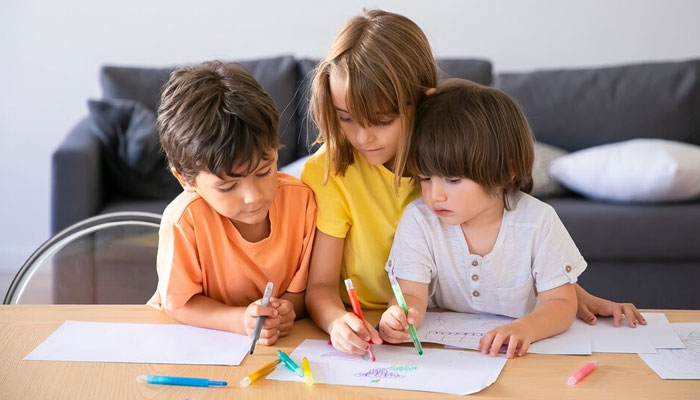- +91 7680015156
- advaithacdc@gmail.com
Exploring Learning through Play: Educational Activities for Kids
- Home
- Blogs
- Exploring Learning through Play: Educational Activities for Kids
In today's fast-paced world, where screens dominate and schedules often leave little room for spontaneous exploration, the value of play in a child's education cannot be overstated. Play is not just about having fun; it's a crucial component of a child's development, fostering creativity, problem-solving skills, and social interaction. In this blog post, we'll delve into the importance of learning through play and explore some engaging educational activities for kids that promote holistic development.

The Importance of Learning through Play
Play is a natural and instinctive behavior for children, serving as their primary mode of learning about the world around them. Whether it's building blocks, pretend play, or outdoor adventures, every playful activity offers valuable opportunities for growth and development.
Cognitive Development
Play stimulates cognitive processes such as imagination, memory, and problem-solving. When children engage in imaginative play, they explore various scenarios, experiment with different roles, and develop critical thinking skills.
Social Skills
Through play, children learn essential social skills such as cooperation, negotiation, and empathy. Collaborative games and group activities encourage communication and teamwork, laying the foundation for healthy relationships later in life.
Emotional Regulation
Play provides a safe space for children to express and regulate their emotions. Whether they're role-playing different emotions or engaging in physical play to release pent-up energy, play helps children develop self-awareness and emotional resilience.
Physical Development
Active play, both indoors and outdoors, is crucial for physical health and development. From gross motor skills like running and jumping to fine motor skills like drawing and building, play activities support the development of coordination, strength, and agility.
Educational Activities for Kids
Now that we understand the importance of learning through play, let's explore some educational activities that parents, teachers, and caregivers can incorporate into children's daily routines:
Nature Scavenger Hunt
Take children outdoors and encourage them to explore nature with a scavenger hunt. Create a list of items for them to find, such as leaves, rocks, flowers, or animal tracks. This activity promotes observation skills, curiosity, and appreciation for the natural world.
Storytelling and Puppetry
Set up a storytelling corner with puppets, props, and storybooks. Encourage children to use their imagination to create and act out their own stories. This activity enhances language development, creativity, and confidence in self-expression.
STEM Building Challenges
Provide children with building materials like blocks, Legos, or recycled materials, and challenge them to build structures based on specific criteria or challenges. This hands-on activity promotes problem-solving, spatial reasoning, and engineering concepts.
Kitchen Science Experiments
Turn your kitchen into a science lab and conduct simple experiments with everyday materials. From making slime to baking soda volcanoes, these experiments teach children about chemical reactions, measurement, and the scientific method.
Art and Sensory Play
Set up art stations with various materials like paints, clay, and collage materials, allowing children to explore different textures, colors, and techniques. Art and sensory play encourage self-expression, creativity, and fine motor skills.
Music and Movement Activities
Incorporate music and movement into daily routines with singing, dancing, and playing musical instruments. Music enhances auditory processing, rhythm recognition, and coordination while providing a fun outlet for self-expression.
Dramatic Play Centers
Create themed dramatic play centers, such as a grocery store, doctor's office, or space station, complete with props and costumes. Dramatic play encourages imaginative thinking, role-playing, and social interaction.
Learning through play is a powerful and effective way to nurture children's holistic development. By incorporating educational activities that engage their minds, bodies, and emotions, we can create enriching experiences that lay the foundation for a lifetime of learning. So, let's embrace the joy of play and explore the endless possibilities for learning and growth it offers to our children.
Articles
- 7 Strategies to Accomplish Positive Compliance with Retained Primitive Reflex Integration
- Child with Zinc Deficiency may show signs of Learning Challenges
- Hands-Grasping Reflex Delays Handwriting and Speech Development if Retained
- Deep Breathing Activities to Calm Sensory Meltdowns and Ground Emotions
- 3 Retained Primitive Reflexes Responsible for Poor Balance
- toe walking
- Anxious Behavior
- Retained Primitive Reflexes that Cause Sensory Sensitivities
- Retained Primitive Reflexes Causing Picky Eating, Sugar Cravings and Compulsive Eating
- Tactile Defensiveness
- 10 Fun Activities to Boost Your Child's Speech Development
- Exploring Learning through Play: Educational Activities for Kids
- Why Crossing the Midline Activities Helped this Childrens Listen to his Teacher
- Music Therapy: Study Says Music Key for Non-Verbal Children and Children with Speech and Language Delays
- Tactile Toys for Sensory Defensiveness and Tactile Stimulation

